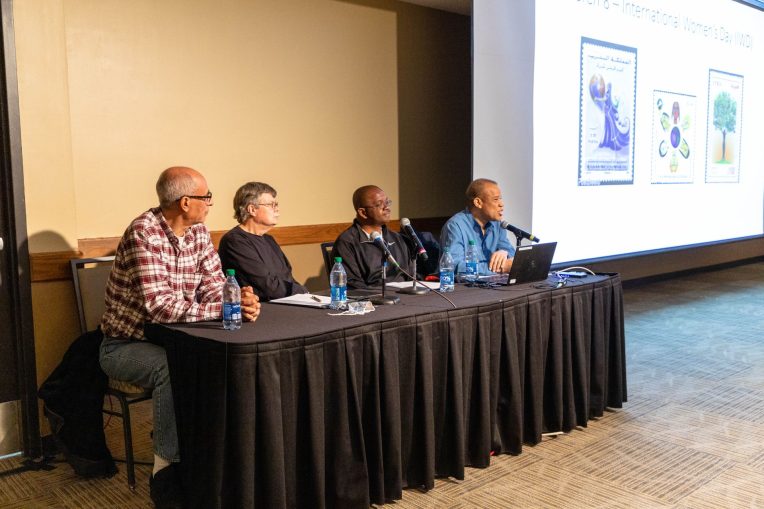“Soccer is really my life,” said Rabah Seffal, who was part of a four-person panel that led the discussion, “The FIFA World Cups of Soccer—Joy and Context,” for the Spring 2023 International Seminar Series held March 8 in the Old Main Room of the Bone Student Center.
Seffal, 66, is a retired engineer who worked at Caterpillar. He still plays the game he’s loved since he was a boy in his native Algeria. He’s lived in Bloomington since 1998 and has been a member of the local Park Drag United Soccer Club for more than 14 years. The name comes from Park Drag Lane in Normal, one of the areas where the group has played.
“I didn’t know there was soccer here,” Seffal said. “Soccer has allowed me to mix with people—Americans, South Americans, some people from Sudan, and we became friends.”
He said the best parts of playing at his age are the camaraderie, the laughter, and the fact that he de-stresses when he kicks the ball.
“If I score a goal—it doesn’t happen very often—I do my North African dance,” he said.
Soccer—or football to the sporting world outside the United States—is a game of great passion for its millions of fans. Those passions have been known to boil over when rivalries become too heated. But here in Bloomington-Normal, soccer is a uniter and a common bond for members of a local soccer club who have come together because of their shared love of “the beautiful game.”
The seminar’s theme was the idea of soccer fan Dr. Craig McLauchlan, associate vice president for research and graduate studies in the Office of the Provost. McLauchlan invited people he knew well who could speak with expertise about the meaning of soccer in their lives. In addition to Seffal, panelists included Dr. Agbenyega Adedze; Mboka Mwilambwe ’94, M.S. ’96; and Rick Gardner ’98. The subheading of the seminar was: “Joy of the Game—How Soccer Opens Doors in Our Community and Around the World.” With the room filled with soccer enthusiasts, McLauchlan thought the timing was good for such a gathering.
“With the men’s World Cup back in the fall and the upcoming women’s World Cup, it was like an excuse to talk about soccer,” he said. “The OIE (Office of International Engagement) was trying to revamp the seminar series because it had been on hiatus with the pandemic. So, I asked my soccer friends. It became a seminar series of the willing.”
Three of the four panelists are immigrants who recalled that finding soccer here was important to helping them feel more comfortable in their new surroundings.
A native of Ghana, Adedze, a history professor at Illinois State, specializes in African history. He also has a love for stamp collecting with particular interest in postage stamps that nations produce with soccer themes during World Cup years. The stamps, he said, are an attempt by countries to portray themselves as they wish to be seen by the rest of the world.
For example, Benito Mussolini and Italy put out a stamp for the 1934 World Cup that depicted Italian players of great size and strength. Pointing to the stamp on a wide screen, Adedze said the players on the stamp looked more like rugby players.
“It was an image of strong Italian people who were going to dominate the world with fascism,” Adedze said.
Gardner, a Bloomington native, is retired from Illinois State. He’s been around soccer since high school and has played and coached. He continues to play, but his role now is as sort of the commissioner or keeper of rules for the Park Drag group. The rules, he said, don’t please purists but are there to keep players safe.
“Most of us are around 50, and our oldest player is 75,” Gardner said. “The No. 1 concern is for the safety and welfare of our players.”
All genders, ages, and skill levels are welcome. Among the 50 players, about 30 nations are represented. There are no referees, and no slide tackles are allowed. In addition, handballs are fouls, and when a player falls down, play is stopped. Keeping score is optional, and teams are divided up by skill levels.
“Be punctual, be honest, be fair and reasonable, be a good sport, and play safe.”
Rick Gardner
“Be punctual, be honest, be fair and reasonable, be a good sport, and play safe,” Gardner said he asks of participants.
Mwilambwe is the assistant director of Illinois State’s Office of Equal Opportunity and Access. He also serves as mayor of the City of Bloomington. He arrived in town in 1990 as a student. He’s been playing soccer since the age of 4 and said the game plays important social, political, economic, and community building roles in a society.
“When I think about my own country the DR (Democratic Republic) Congo where I was born, you have 400-plus ethnic groups, with people speaking many different languages,” he said. “Imagine the potential for strife, for chaos. We are all united by our love for the national soccer team.
“Even though I have friends from the western part of the country, and my family is from the southern part of Congo, we see ourselves as one.”
For these old soccer friends, the game is so much more than a sport.
“We like the idea that coming to a small place like Bloomington-Normal, people from very diverse backgrounds, from very diverse age groups, genders, and professions are able to come together united around a small soccer ball,” Adedze said. “It brings all of us together.”

